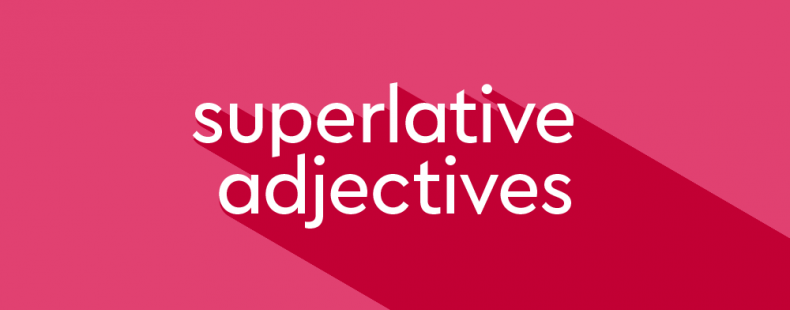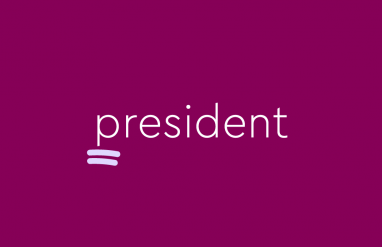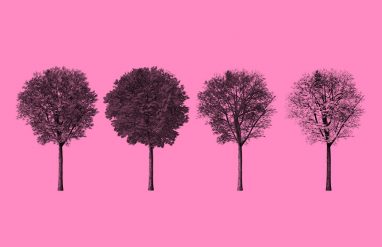Adjectives describe and modify nouns and pronouns. The words smart, funny, happy, and outrageous are all examples of adjectives. Sometimes, however, these adjectives on their own are not enough. You might want to say that a joke is not only funny, but also so funny that no other joke can live up to it. Or you might need to say a shoe smells so bad that its stench dominates every other stinky smell.
While there are many different types of adjectives, there is one in particular that can help you in these situations: the superlative adjective. By using superlative adjectives, you can say that joke was the funniest one you ever heard or that smelly shoe has the worst stench in history. So if you want to be one of the greatest grammarians out there (and oh boy, do you!), keep reading to learn more about superlative adjectives.

What is a superlative adjective?
A superlative adjective is an adjective used in comparisons to describe something as being of the highest degree or extreme. We use superlative adjectives when making comparisons of three or more people or things. The words biggest and fastest are examples of superlative adjectives.
The word superlative has other uses outside of grammar. As an adjective, superlative is used to mean something is the best or highest of its kind, surpasses all others, or is excellent. For example, a superlative cheeseburger would be a cheeseburger that is extremely delicious or is very high quality. Superlative is also used as a noun, which we will explore more later.
To explain how we use superlative adjectives, let’s say we have three sticks that measure one foot, two feet, and three feet long. Of these three, the one that is three feet long can be described as the longest stick because it wins the contest of length. At the same time, the one-foot stick is the shortest as it would win a shortness competition.
A superlative adjective is formed from the positive form of an adjective, which is the initial form of an adjective you will find if you look one up in our fantastic dictionary. The adjectives smart, kind, and slow are adjectives that are in the positive form, for example. The other form—the form between the positive and superlative and marked by –er or more—is known as a comparative adjective. At our entry for an adjective, you will also see noted what an adjective’s comparative and superlative forms are.
Here are the general rules for forming superlatives from a positive form adjective:
- Most one-syllable adjectives: Add -est to the end. For example, warm becomes warmest. If the adjective ends in -e, just add -st. For example, vile becomes vilest. If the adjective ends in -y, you sometimes replace the -y with an -i before adding -est. For example, dry becomes driest but sly can be either slyest or sliest.
- One-syllable adjectives that end in consonant-vowel-consonant: Double the final consonant before adding -est. For example, hot becomes hottest and sad becomes saddest.
- Two-syllable adjectives that end in Y: Drop the -y, replace it with an -i, and then add -est. For example, silly becomes silliest and funny becomes funniest.
- Two-syllable adjectives that end in -er, -le, or -ow: Add -est to the end. For example, narrow becomes narrowest and clever becomes cleverest.
- All other adjectives that are two syllables or longer: Add the word most or least to the positive form. For example, energetic becomes most or least energetic and unbelievable becomes most or least unbelievable.
Note, though, that some adjectives may have more than one acceptable way to form its superlative (e.g., most fun and funnest).
When we use superlative adjectives in sentences, we often precede them with the word the. For example, we would say I want to hug the cutest kitten rather than I want to hug cutest kitten or I want to hug a cutest kitten.
However, if we are comparing something to itself, we may not use the word the. For example:
- Bears are hungriest when waking up from hibernation.
We also may not use the if we use a possessive adjective or possessive noun instead. For example:
- This essay was my longest one yet.
- Out of all of her paintings, I think this one is Diana’s best work.
There are no stupid questions, especially when it comes to the word stupid. So is stupidest a word?
List of superlative adjectives
As long as it makes sense to compare more than two people or things, almost any adjective can be used as a superlative adjective. Here are just some examples of superlative adjectives:
- angriest, most boring, coolest, darkest, least entertaining, fattest, goofiest, hungriest, iciest, jolliest, laziest, most miserable, nicest, most overrated, purplest, quickest, rudest, smallest, tiniest, ugliest, least visible, widest, youngest, zestiest
Where do you include a superlative adjective in a sentence?
Superlative adjectives can be used either directly before the noun or pronoun they modify or can be used as a subject complement that is connected to a noun/pronoun with a linking verb (such as be or seem). In either case, we almost always put the word the (or a possessive) in front of them. For example:
- That was the scariest movie that I ever saw.
- Out of every movie I have seen, that one was the scariest.
What does the noun superlatives mean?
In everyday life and popular culture, the word superlatives is often used to refer to titles or phrases used to describe a person. For example, many high school yearbooks often feature “senior superlatives” that describe a person’s personality or qualities, sometimes in a humorous or tongue-in-cheek way. These often take the form of phrases such as “Most Likely to Succeed,” “Best Smile,” or “Cutest Couple” that actually use superlative adjectives. However, these superlatives may not always use superlative adjectives, such as “Class Clown” or “Future Millionaire.” Still, the word superlative is used as a noun to refer to these labels.
More generally, the word superlative may be used as a noun to mean a superlative adjective. For example, an angry boss may say that they can think of a few choice superlatives to describe their best employee. These could include words such as fastest, most creative, or other superlative superlatives.
Superlatives adjective examples in a sentence
Let’s look at different examples of superlative adjectives used in sentences.
Superlative adjectives using -est
The following example sentences show superlative adjectives that use the -est form.
- Becky is the smartest student in the class.
- I think that Abraham Lincoln was our greatest president.
- If you are looking for good pizza, Luigi’s restaurant has the tastiest in town.
- Out of all my pets, my old cat Nala is the loudest.
Superlative adjectives using most
Longer adjectives generally use the words most and least when used as superlative adjectives. We use the word most to say that something demonstrates the highest degree or is the most extreme out of all options.
- I think that the park downtown has the most exciting roller coasters.
- This might be the most interesting book I have ever read.
- Try each of these cakes and tell me which one is the most delicious.
- Todd was wearing the most ridiculous costume at the Halloween party.
What about a word like fun? Would you say funnest?
Superlative adjectives using least
When using longer superlative adjectives, we use the word least to describe a noun or pronoun as having the lowest extreme of a quality or being most lacking in a particular quality.
- I need to find the least uncomfortable sweater in my closet.
- We are looking for the least expensive apartment in the area.
- When you consider all of the insects in our garden, the ladybugs have been the least destructive.
- The coffee shops are our least profitable businesses.
Irregular superlative adjectives
The adjectives good, bad, well, old, and far have irregular superlative forms. Let’s look at how we use them in sentences. Pay special attention to how the superlative form of far may change depending on its meaning.
- It is important to use the best tool for the job.
- Stephanie is not feeling at her best today.
- That might just be the worst idea I have ever heard.
- My eldest son became a stock broker.
- Thanks to her intense training, Ana managed to sprint the farthest out of all of the racers in the given time.
- We searched the furthest ends of the Earth for the missing wallet.
Sometimes, the word baddest is used as a slang superlative form of bad. For the most part, baddest is not used in formal writing or speech.
- The famous boxer Mike Tyson was once known as “The Baddest Man on the Planet.”
Superlative adjective rules & best practices
Like many other types of adjectives, you can use superlative adjectives both immediately before nouns/pronouns or as subject complements. It is even possible to use multiple superlative adjectives to describe the same noun/pronoun:
- This is the spiciest, yummiest soup I have had yet.
- Out of all of the monsters, the zombie is both the slowest and the stinkiest.
- Mittens is the cutest, most adorable kitten alive.
There are a few grammatical rules you need to remember when using superlative adjectives, however.
1. Superlative adjectives are only used to compare more than two people or things. When comparing exactly two people or things, we instead use comparative adjectives. For example:
❌ Incorrect: Cheetahs are fastest than turtles.
✅ Correct: Cheetahs are faster than turtles.
If you are comparing something to every other member of its group or saying that something has the highest or most extreme degree in general, we use a superlative adjective:
❌ Incorrect: Out of all of the animals in the zoo, the cheetahs are the faster.
✅ Correct: Out of all of the animals in the zoo, the cheetahs are the fastest.
2. When using superlative adjectives, it is considered nonstandard to use both the -est ending and the word most or least at the same time. You should generally use an adjective’s standard superlative form, although sometimes people may intentionally break the rules for comedic or rhetorical effect. If an adjective can use either, you should consistently use one form:
❌ Incorrect: Ice cream is the most tastiest food.
✅ Correct: Ice cream is the tastiest food.
❌ Incorrect: Equality is our most preferredest outcome.
✅ Correct: Equality is our most preferred outcome.
❌ Incorrect: I need to find the most quietest room in the house.
✅ Correct: I need to find the quietest room in the house or I need to find the most quiet room in the house.
3. In general, we use the word the or a possessive word ( such as my, her, Xavier’s) in front of a superlative adjective unless we are comparing something to itself.
❌ Incorrect: He sat under tallest tree.
✅ Correct: He sat under the tallest tree.
❌ Incorrect: Math is most hated class.
✅ Correct: Math is Edward’s most hated class.
✅ Correct: In my experience, cats are the grouchiest when their sleep is interrupted
✅ Correct: In my experience, cats are grouchiest when their sleep is interrupted.
One final thing to keep in mind is that the words most and least are not only used in superlative adjective forms. Most and least have a variety of meanings, so don’t assume a sentence has a superlative adjective just because you see the word most or least. For example, the sentence The detectives were fascinated by a most puzzling case uses most as an adverb to modify the adjective puzzling. However, puzzling is NOT a superlative adjective in this sentence.
You’ll be the best with Grammar Coach™
Improve your writing with Thesaurus.com’s Grammar Coach™, which catches grammar and spelling errors and provides Thesaurus-powered synonym suggestions. Using machine learning, this tool can spot the difference between comparatives and superlatives, their correct and incorrect uses—and much more! With Grammar Coach™, your writing will be smarter, stronger, and more polished.














